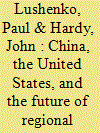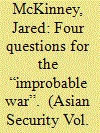|
|
|
Sort Order |
|
|
|
Items / Page
|
|
|
|
|
|
|
| Srl | Item |
| 1 |
ID:
143925


|
|
|
|
|
| Summary/Abstract |
The concept of order in regional security is often characterized as hierarchical, consensus-based, or some hybrid middle-road. The debate largely focuses on how major powers, specifically China or America, can individually build an accommodating order. This article explores the causation of order-building in reverse by asking if the Sino-US relationship can create order as a by-product of individual attempts to build and manage security. It examines Chinese and American responses to North Korea and the South China Sea to demonstrate that order can be constructed through a complex set of negotiated interactions, which encompass cooperative, hierarchical, and consensus-building approaches to order-building. This “unhappy coexistence” implies that order as a by-product of state interaction is a useful but incomplete framework to understand security order-building.
|
|
|
|
|
|
|
|
|
|
|
|
|
|
|
|
| 2 |
ID:
143928


|
|
|
|
|
| Summary/Abstract |
“As long as the US holds tight to its values and solves its problems at home,” Andrew Nathan and Nathan Scobell have written in a well-regarded 2012 book, “it will be able to manage the rise of China.”1 This sentiment admirably expresses the long-standing consensus of the Washington, DC foreign policy elite: by using a combination of economic engagement, military balancing, and diplomatic pressure, the US can socialize Chinese elites while checking Chinese power. In such a scenario, China will rise, but it will rise within the existing international system. And even were China to consider violating contemporary norms—say, against the use of force to resolve disputes—the military power of the US and its allies would be overwhelmingly sufficient to deter, defend, or defeat the transgression. China’s rise, in short, need not threaten the status quo as long as the western powers deepen economic interdependence, preserve maritime supremacy, and maintain leadership of the international system.
|
|
|
|
|
|
|
|
|
|
|
|
|
|
|
|
| 3 |
ID:
143927


|
|
|
|
|
| Summary/Abstract |
This article looks at Chinese foreign policy through the lens of Social Identity Theory (SIT). It aims to show how that approach can give us new insight into a whole series of issues relating to the rise of China. It also tries to show, more generally, how SIT can serve as a useful tool for understanding international politics. In substantive terms, the main claim here is that China has consistently pursued a social creativity strategy (one of the three standard SIT strategies) from the Deng Xiaoping era until the present. The article argues that the concepts of respect and disrespect can provide us with a useful framework for better understanding the conditions for an outbreak of a conflict given a social creativity strategy; it then examines the Taiwan Strait Crisis of 1995–1996 as a plausibility probe. All this supports the basic conclusion that overall China’s rise would be more peaceful than threatening.
|
|
|
|
|
|
|
|
|
|
|
|
|
|
|
|
|
|
|
|
|